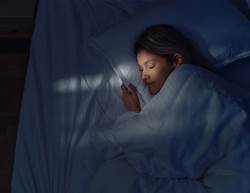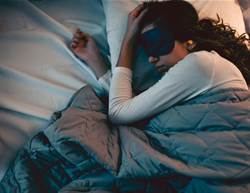Half of all adult Australians report they sleep badly according to the Sleep Health Foundation. So what’s robbing you of a refreshing night of sweet dreams? Here’s a wake-up call on 10 common slumber-stealers.
1. Sleep apnoea
Many people think this condition, which causes a person to stop breathing repeatedly during the night – sometimes hundreds of times, for a few seconds to a full minute – and then briefly wake up, affects only overweight men. But as women age, and especially as they go through menopause, they become just as likely as men to have sleep apnoea – even if they’re at a healthy weight.
In fact, research shows that one in 10 women are likely to have clinically significant sleep apnoea but that 85% of cases go undiagnosed. One reason is that women have different symptoms than men do. Snoring, a major tip-off that men have the disorder is less common in women. They’re more likely to develop symptoms related to being sleep deprived, such as difficulty thinking of the right word, clumsiness, fatigue, depression, or anxiety, says Katherine Sharkey, assistant dean for women in medicine and science at Brown University.
SLEEP SOLUTION: If you notice these symptoms, tell your doctor – the medical community is becoming more aware that apnoea isn’t just a man’s problem. To determine whether you have the disorder, you’ll likely undergo a sleep test – either in a clinic or at home – during which you’ll be monitored for breathing and oxygen levels throughout the night.
The most common treatment for apnoea is a CPAP (continuous positive airway pressure) machine, which helps maintain airflow while you sleep. Unfortunately, this machine can be cumbersome to use, so many people may start with good intentions but fall out of the habit of using it every night.
The good news is there are oral devices, which look a bit like mouthguards, that can treat mild to moderate sleep apnoea.
2. Mild depression
Just as people with major depression can have trouble falling or staying asleep, so too can people who have a low-grade form of the illness. But because their symptoms –which include negative thoughts, excessive worry, lack of energy, and body aches –aren’t as severe, women with mild depression are less likely to be diagnosed with sleep issues.
“There’s a complex relationship between sleep and mild depression, and it can be difficult to determine which came first,” says psychologist Aarti Gupta. It’s a vicious circle, she says: depression symptoms set up poor sleep habits that can cause you to stay up or wake up in the middle of the night. And without a good night’s rest, it’s difficult to function at your best the following day – which manifests as feeling tired, sad, and mildly depressed and so it sets up the cycle for lack of sleep for the next day.
SLEEP SOLUTION: Because the symptoms of mild depression can be similar to those many women experience during menopause, it’s worth discussing them with your GP, who can take into account whether your depressive symptoms existed prior to menopause or if hormonal changes have triggered or exacerbated them. They can then recommend the best treatment for you, whether it is talking with a psychologist, making lifestyle changes, adjusting your medication, or all three.
3. Changing internal clock
Everyone has a biological clock that determines when they get tired at night and when their body wakes up in the morning. But starting around age 40, your clock begins to shift. Researchers aren’t sure exactly why this happens, but the result is that your body will naturally wake up increasingly earlier, decreasing the amount of sleep you’re getting. By the time you hit your 60s, you could be waking up two hours earlier than you did in your 30s.
SLEEP SOLUTION: Go to bed earlier to accommodate your body’s new sleep schedule. Your body is likely to be getting tired earlier, but it’s easy to ignore or not notice the sleepiness if you’re used to staying up late.
4. Thyroid condition
An overactive or underactive thyroid could be setting off a domino effect of hormone imbalances that make it hard to fall asleep or stay asleep. When a thyroid is overactive, your heart races, your adrenalin surges, and you can experience insomnia and anxiety. When the gland is underactive, a condition that becomes more common after age 50, you’re up to 35% likelier to have sleep apnoea.
Thyroid problems hit women especially hard – they’re up to eight times more likely than men to have thyroid problems, and up to 60 per cent don’t realise their insomnia is thyroid-related. It can be tricky to identify a thyroid disorder as the cause of sleep problems because the other symptoms that accompany such disorders – depression, weight loss or gain, anxiety, and gastrointestinal issues – can seem unrelated to sleep.
SLEEP SOLUTION: Your doctor can confirm or rule out a thyroid disorder by ordering a series of blood tests: TSH (thyroid-stimulating hormone), T4, T3, and thyroid antibodies. Depending on these results, a thyroid ultrasound will provide a clear picture of the health of your thyroid. Prescription medications can help get your hormone levels back to where they should be.
5. Acid reflux
This condition, in which acid backs up your stomach into your oesophagus, can affect sleep whether or not it results in heartburn. Even if you don’t feel a burning sensation, the acid in your oesophagus triggers a muscular reflex to clear it, which can wake you up. This helps explain why people with chronic acid reflux are more than twice as likely to have sleep problems.
SLEEP SOLUTION: Lifestyle changes like eating smaller meals, not eating late at night, and losing weight can go a long way toward preventing acid reflux, and occasional bouts can be handled with antacids and other over-the-counter treatments. If it becomes a regular occurrence, consult your doctor, as there may be underlying health conditions that need further investigation and prescription medicine.
6. Being a caregiver
Being a caregiver is tough on your mental health. If your loved one is ill or has dementia, you may become sad and anxious, which affects sleep. In addition, you may be woken up during the night to care for someone. Recent research shows that 50% of caregivers report poor sleep quality.
SLEEP SOLUTION: You need peace of mind to sleep restfully, so taking steps to reduce your night-time anxiety is key. If you’re worried about a loved one falling down on the way to the bathroom, get a bedside commode or install low-level lighting to brighten the path. Hiring a night-time attendant or asking a friend or family member to take the late shift a few times a week can also help. Taking chamomile supplements may soothe stress as well. In one study, patients with generalised anxiety disorder who took supplements with 220mg of German chamomile for 8 weeks saw a significant decrease in anxiety.
7. Excess belly fat
When you carry extra weight in your mid-section, your body has to work harder to breathe when you lie down, which can cause sleep problems. Belly fat can also trigger higher levels of inflammation in your body that disrupt the neurological pathways that control sleep.
SLEEP SOLUTION: Researchers at Johns Hopkins University in the US found that the more belly fat you lose, the bigger the improvement you’ll see in your sleep. In addition to cutting kilojoules and stepping up exercise (which will help you lose weight all over your body), try incorporating more monounsaturated fatty acids from foods like olive oil, nuts, and avocados into your diet. Increasing these in sensible portions can be a powerful defence against weight gain, diabetes, heart disease, and belly fat.
8. Vitamin D deficiency
More than one-third of Australians have a vitamin D deficiency, according to a recent study, despite this being dubbed the ‘sunlight’ vitamin and the amount of daylight we get in Australia. Lack of vitamin D is linked to cardiovascular disease, cancer and weaker bones, and it also has a direct effect on the parts of the brain that play a role in sleep. Research has shown that 12% of people with low levels of vitamin D slept for less than five hours a night, and 57 per cent were awake for 90 or more minutes in the middle of the night.
SLEEP SOLUTION: Your body produces vitamin D when your skin is directly exposed to the sun. If you’re deficient, which your doctor can determine with a blood test, you can boost your levels by eating foods such as fatty fish, eggs and vitamin D-fortified milk or orange juice. In some cases taking a vitamin D supplement may be necessary.
9. Breathing problems
When your nose gets temporarily stuffed up – whether from seasonal allergies or a cold – you’re likely to toss and turn at night because you’re struggling to breathe. But other factors can narrow your airway permanently, such as a deviated septum, nasal polyps, large tonsils, or an overly large tongue. And these conditions can increase sleep disturbances: when researchers at the Sleep and Human Health Institute in the US studied 20 people with chronic insomnia, they found that 90 per cent of the participants’ middle-of-the-night wakings were linked to breathing issues.
SLEEP SOLUTION: It won’t treat the underlying issue, but lying on your side may help you sleep better as breathing problems tend to worsen when you sleep on your back, says Steven Park, an ear, nose and throat specialist. If this doesn’t help, ask your GP for a referral to a specialist. The typical course of action is a physical exam to see if there is a blockage in your nose or throat, says Park. The fix may be something simple like a nasal breathing strip or a device to help you breathe (such as a CPAP machine), although in some cases surgery is recommended.
10. A less-than-positive attitude
“The more favourably you look upon sleep – believing it makes you happy and that you feel refreshed after a full night of rest – the longer you’ll actually sleep every night,” according to psychologist Hannah Peach. In a recent study, Peach asked participants to rate how favourably they viewed sleep (with ‘1’ meaning “strongly disagree” and ‘5’ meaning “strongly agree”). She found that for every point higher their scores averaged, the time they spent in slumber increased by nearly 40 minutes.
SLEEP SOLUTION: If you have trouble convincing yourself that sleep is something your body needs, which can help ensure that you get enough, try keeping a sleep log. Include how much sleep you got and how you felt throughout the day: how happy you were, how easy it was to concentrate, how hard the afternoon slump hit you. Remember, sleep isn’t a luxury; it has a massive impact on how we feel and how we behave to those around us.









